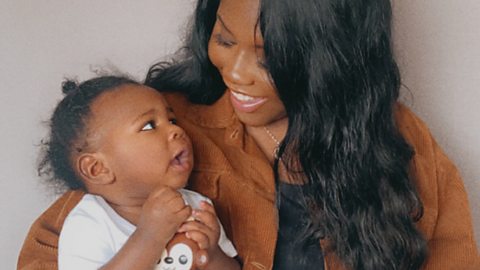Lewis, 22, lost his father and his step-father shortly before becoming a dad. He talks about his experience of being a parent dealing with mental health issues.
Finding out the news
It was scary finding out that I was going to become a dad, but I was delighted by the news. My girlfriend didnŌĆÖt have the best of pregnancies as she was feeling unwell a lot of the time, however at the same time, everything was going well. We had great support from family and friends and I loved buying the baby stuff. I wanted to dress him like me, so we bought him a Newcastle strip ŌĆō my dad was a Geordie and thatŌĆÖs how I started to support them.
I was excited about becoming a dad.
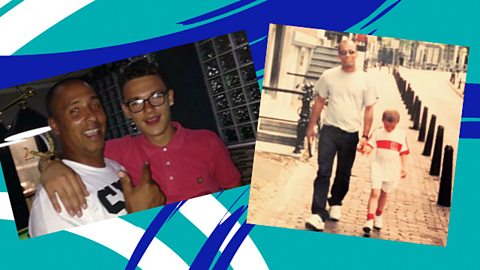
Losing two fathers
I lost both dads and became a father at 19. My stepdad had a seizure in the weeks leading up to my sonŌĆÖs birth. My mum took him to the hospital for scans and found out that he had stage 4 terminal lung cancer and brain tumours. He died 28 days later. Then, just two weeks before my son Lewis was born, my dad had a heart attack. It was horrible because up to when he died, I was still grieving my step-dad, who had been in in my life for 20 years. Losing two of the most important people in my life left me in a terrible state. I was still working out what it meant to become a man and suddenly I realised I had nobody to turn to with questions about fatherhood.
Lewis was born in August 2017, and the next day I had my dadŌĆÖs funeral.

Grief and mental health
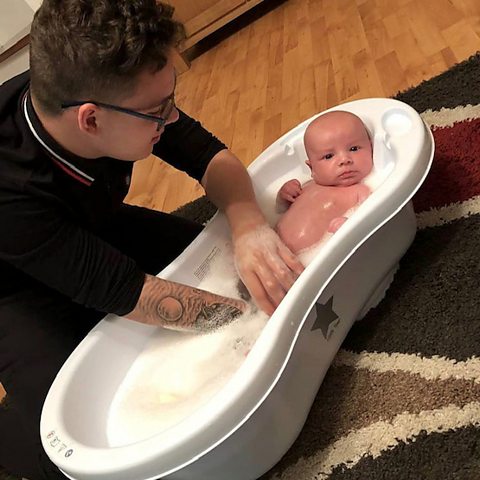
IŌĆÖm fortunate enough to have a lot of support for my mental health these days, but when I think back, I canŌĆÖt actually remember the first 3 months of my sonŌĆÖs life. I was heavily grieving and my mental health was in a terrible state. Losing both fathers made it hard to connect with my son at first.
It was confusing having so much to deal with, and I didnŌĆÖt know how to cope with the level of responsibility.
When my girlfriend shows me pictures and says ŌĆ£do you remember that?ŌĆØ, I donŌĆÖt recall a lot of what IŌĆÖm seeing. My mental health deteriorated to a point that I was drinking every single night as a form of self-medication - which definitely didnŌĆÖt help. I had a breakdown and became suicidal, but at the time I associated what I was feeling with the grieving process, thinking that it must be a normal re-action to losing someone important. I didnŌĆÖt realise that I was suffering from depression. It affected my ability to be a parent and made me feel that I was trying to force a bond with my son, trying to force myself to love him rather than it being a natural process.
Getting support
My partner persuaded me to seek professional support. It was scary taking that step, but I went to the doctor and fortunately there was a mental health practitioner based at my doctorŌĆÖs. I started meeting her once a week. At first, I didnŌĆÖt want to talk, and it took a lot of persuasion to make me open up. I realise now that I had to do that or I wasnŌĆÖt going to be able to carry on living the way I was.
I was told that my mental health issues fell into the category of manic depression, and I was prescribed medication. At first I found it really difficult, but over time it was very beneficial to speak to someone who didnŌĆÖt know me, my family or my background. It helped me process the losses I had experienced and made me realise that I had a lot to live for. When I think back now, it obviously wouldnŌĆÖt have been fair to leave my son and my partner behind, having lost both of my dads.

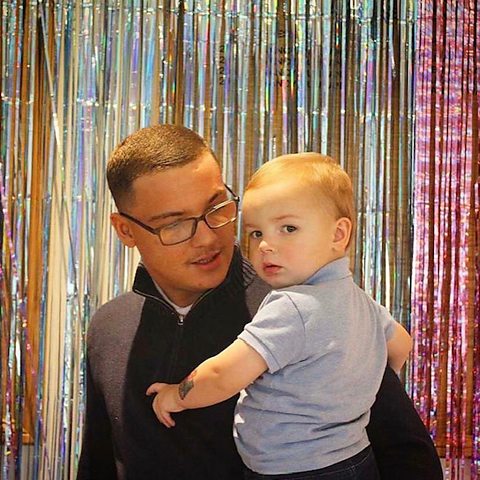
Peer-to-peer support
My girlfriend saw an article about Ricky Gervais promoting a peer-to-peer support group called AndyŌĆÖs Man Club. They were starting weekly meetings in Edinburgh and she suggested I should try it. At first I thought, ŌĆ£IŌĆÖm not going to talk to men about the sort of stuff I speak to my mental health practitioner about.ŌĆØ
After talking it over I thought: ŌĆ£whatŌĆÖs the worst that could happen? If I donŌĆÖt like it I donŌĆÖt have to stay.ŌĆØ ItŌĆÖs definitely one of the best decisions IŌĆÖve ever made in my life. IŌĆÖve been going there for about a year and a half now. The main facilitator at my group is called James and over the past year and a half he has helped so much in my recovery.
Men from all over Edinburgh go to meetings to get stuff off their chests, as well as asking questions and listening to each other. It doesnŌĆÖt even need to be mental health-related ŌĆō every week we always find something to talk about.
IŌĆÖve started helping out as a facilitator at the club, too. I think it takes a lot of bravery for some men to talk about how theyŌĆÖre feeling. I know a couple of guys in my group whoŌĆÖve never spoken to anybody until now, and theyŌĆÖre getting 40 years of hurt off their chests.
I think you can really see the change in people over time.
Regularly talking about how I feel has made me a better father, a better boyfriend, a better all-over human being.

Men's mental health stigma
Unfortunately thereŌĆÖs still a lot of stigma around menŌĆÖs mental health. Working in construction, IŌĆÖve encountered a fair amount of toxic masculinity and men who donŌĆÖt want to talk about their feelings. I believe itŌĆÖs time for a change. The suicide rate of men in the UK every week is heartbreaking. People are losing family members every day because men donŌĆÖt feel safe talking about how theyŌĆÖre feeling.
I just hope that by the time Lewis is of an age where these issues may affect him, the stigma is reduced and itŌĆÖs completely normal for men to talk to others, including their friends, about mental health.
IŌĆÖm hoping that by the time my son is older thereŌĆÖs somewhere to go for mental health support in every town across the UK.
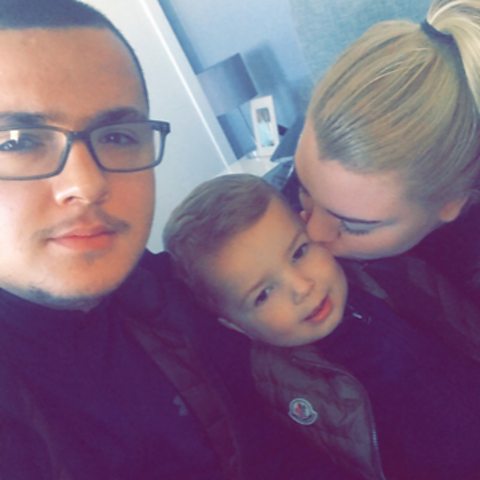
Lewis's tips
Try and appreciate the things you have
Just after my dad died, we were fortunate enough to be able to buy our own house to help secure our familyŌĆÖs future. When I look back, I realise that my son Lewis arrived at the right time. He gives me a reason to get up and go to work in the morning, and any sacrifices IŌĆÖve had to make over the years are totally worth it. I do everything I can to be the best dad I can possibly be, and I honestly feel that having Lewis has been the best thing thatŌĆÖs ever happened to me.
Keep a routine where you can
My work plays a big part in helping my mental health. IŌĆÖm one of the people who needs structure and routine, and I get on really well with my colleagues. Getting up at the same time every day and sticking to a structure really helps.
Talk to others
Some people donŌĆÖt need professional support, they just need a space they can talk. For me thatŌĆÖs AndyŌĆÖs Man Club, for other men it might be something different.
Seek out support
Trusting a professional with my mental health was really scary at first, but itŌĆÖs one of the most im-portant things IŌĆÖve ever done. It takes a lot of courage to be open about what youŌĆÖre going through. It doesnŌĆÖt need to be a therapist, it could be a family member or a friend.

Further support
If you're worried about your mental health, then it's worth speaking to your GP or seeking other professional help.
│╔╚╦┬█╠│ Action Line has links and contact information for a number of organisations that may be able to help.
has men's talking groups throughout the UK.

